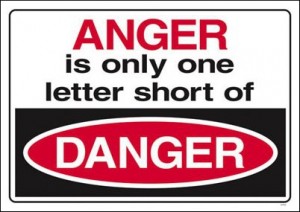Anger Management

December 27, 2016 by Elaine Walker in News
Anger is a Powerful Emotion
Have you ever witnessed someone ‘lose it’; ‘chuck a wobbly’; ‘spit the dummy’?
Perhaps you have your own favourite phrase to describe an angry response but the Australian term:
‘she/ he spat the dummy’ says it all!
Regressing to a childlike tantrum confirms that intellectual intelligence is no match for the powerful emotion of anger.
Uncontrolled anger contains ‘emotional warriors’ and the ‘distorted thinking brigade’!
The verbal abuse that this duo can throw at their target often hits ‘bulls eye’ inflicting emotional wounds that can cut deep into the other person.

Relationship Counselling Can Help Couples Manage Their Anger
In the domestic world, raging anger can sabotage a once loving relationship and all too often lead to separation and divorce.
Managing Anger in a productive way can make life so much easier, calmer and more peaceful.
The Power of Emotions
Frustration, irritation and disappointment are three powerful ‘emotional warriors’ that can attack without warning. The victim of this verbal abuse may retaliate or keep quiet to avoid an argument, particularly if they fear physical abuse may follow. Either way, verbal abuse still comes under the category of domestic violence, just as physical abuse does. When a person is tired, drunk, or feeling ill, their tolerance can be lower, but these factors should never be held up as an excuse for a mild irritation escalating into aggressiveness.
Anger is a very powerful emotion and is part of our biological history and our natural ‘fight or flight’ response. Anger helped mankind in the past to survive but in today’s world its usefulness is limited. Anger is a warning signal within us that something is wrong and indeed we need to ‘listen’ to that sensation and respond in a way that is helpful, not harmful to others, or to ourselves.
In some instances, anger can energise us, motivate us, particularly if we are passionate about an injustice, but anger needs to be on a ‘tight rein’ as it can soon escalate out of control into aggression. Knowing how to outsmart the anger triggers and take back control of the ‘emotional warriors’ and ‘distorted thinking brigade’ can keep you out of a lot of trouble.
Know Your Anger Triggers
What may cause one person to react angrily to a situation may not bother another person so knowing what factors may trigger an angry response in you and how your body sensations change is a good starting point to you staying in control and avoiding an emotional ‘explosion’.
Know Your Anger Triggers
Do You Know When You Are Becoming Angry?
What, or who, has the potential to trigger your level of anger?
What is it about this person, or situation that you are struggling to cope with?
(is it something they say, or do, or is it because you are feeling stressed or worried and your tolerance to general life has plummeted?)
How much do you trust yourself to stay in control and handle the situation calmly?
Have you ever hurt someone when you have been angry or hurt yourself during an angry ‘meltdown’?
Have you ever thrown a mobile phone, thumped a door, or damaged property in some other way?
Sustained Anger Can Affect Your Health Reacting angrily to situations can affect your long term health. Preserve your Health. Choose Counselling or Hypnotherapy to help you manage your anger in a better way and avoid angry outbursts. Enjoy living a more peaceful and enjoyable life. Health and Happiness to you.
For Help With Anger Management please call:
Elaine Walker Clinical Hypnotherapist and Specialist Counsellor 9300 6026
Search
Services
- Abuse (Domestic Violence)
- Addictions
- Anger Management
- Childhood Issues
- Depression
- Divorce and Separation
- Fears & Phobias
- Grief and Loss
- Habits to Health
- Pain Management
- Parent/Teen Conflict
- Parenting Issues
- Quit Smoking
- Relationship Problems
- Reduce/Quit Alcohol
- Stress-Friend or Foe
- Sleep Problems (Insomnia)
- Self Confidence & Self Esteem
- Stress & Anxiety
- VGB Weightloss
- Weight Problems
Recent Posts
April 21, 2017
December 27, 2016
December 27, 2016
December 27, 2016






